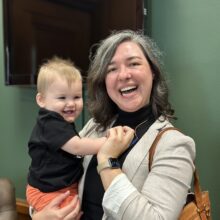The shadow of the shutdown
Early Bird readers, hello again. Newcomers, welcome! If you were forwarded this email, you can sign up here to receive it every two weeks, and join our conversation on issues facing North Carolina’s young children and those who support them. If you’re already a subscriber, please help us reach more people by sharing this with your friends and co-workers interested in early childhood education.

In the shadow of the federal government shutdown over the last month, Liz and I have continued criss-crossing North Carolina to learn about local and state attempts to make high-quality child care more accessible and affordable.
I was in New Hanover County on the east coast at the beginning of the month to learn about how Cape Fear Community College is providing free drop-in child care to its students — in addition to operating a five-star licensed child care center. We put together a playbook for other community colleges that might be interested in following suit, which you can read here.
I also stopped by Bladen County to visit Dr. Amanda Lee, the president of Bladen Community College. Her team applied for and received a grant to start a child care academy after she read this article from EdNC. Her plans for expanding access to child care don’t stop there, and I’m excited to share more with y’all in the next few weeks. Stay tuned!
Back in Raleigh, I sat in on the most recent meeting of Gov. Josh Stein’s bipartisan Task Force on Child Care and Early Education, where the focus was on a variety of potential statewide strategies to shore up the state’s licensed child care system.
Then I headed west to Catawba County to meet Jennifer Sonnek, a high school teacher and the owner/operator of a licensed family child care home (FCCH) in Hickory. She’ll be featured in our Profiles in Care series later this week as she celebrates 20 years of operating Shining Stars FCCH. She’s bucking the trend of FCCH closures, which our latest quarterly analysis found make up 97% of the net loss in licensed child care since before the pandemic. Shout out to Jennifer!
Liz and I met up in the mountains — after she had traveled to Washington, D.C., Onslow County, Wake County, and Edgecombe County — for an early childhood team retreat. We took time to debrief on lessons we’re learning from the local, state, and national level, and to imagine the early care and learning future we want to live in.
While the shutdown causes the furlough of 258 North Carolina Head Start staff, disrupts care for up to 4,500 children, and puts 1.4 million North Carolinians — including more than 580,000 children —at risk of food insecurity due to a pause in SNAP benefits, we continue to see local communities rally around potential solutions to the state’s child care crisis. We’ll keep lifting those up for y’all, whether the federal government is shut down or not.
More from EdNC on early childhood
Child care advocates point to teacher wage supplements as low-cost, urgent fix
There is not enough child care to meet families’ needs. The main reason, experts say, is that child care teachers cannot afford to stay in the profession. “The workforce issues in child care centers themselves really drive a lot of...North Carolina continues to lose licensed child care programs
Members of Gov. Josh Stein’s bipartisan Task Force on Child Care and Early Education got an update on licensed child care closures during their most recent meeting. “Just in the month of August, we had more than twice as many...More than 500 child care directors, owners call on legislature for subsidy floor to stabilize programs
Child care providers and advocates are asking for $145 million in recurring funding in the state budget to stabilize programs struggling to retain teachers and make ends meet. Legislators returned to Raleigh this week without having passed a budget earlier...How Cape Fear Community College provides drop-in child care at no cost to students
Editor’s note: This article is part of a series on the intersections of community colleges and child care. Other articles in the series are available here. Students at Cape Fear Community College (CFCC) in Wilmington can drop off their children for...The state's top education officials share their priorities at Gov. Stein's cabinet meeting
Efforts to align the state’s educational systems with its economic needs were highlighted by officials across the educational continuum at Gov. Josh Stein’s first education cabinet meeting on Tuesday, Oct. 14. “Fundamentally, student success leads to economic benefit,” Stein said...The big picture for little kids
News & Research
-
Head Start programs flash red lights ahead of November funding cliff - From NBC News
-
Many NC Head Start programs to close as government shutdown continues - From WUNC
-
The Ripple Effects of Cutting Undocumented Children Off from Early Childhood Education - From New America
-
Preschool without a building could be in Maryland’s future - From The Baltimore Banner
-
The Independence Cure: Freedom, Risk and Raising Capable Kids - From Aspen Ideas
-
Municipal Roadmap to Early Childhood Success - From National League of Cities
-
The ECEPTS Journey: Building a National Infrastructure for Early Educator Apprenticeship - From Center for the Study of Child Care Employment
Taking flight! Opportunities to spread your wings
Lunch and Learn - From Prenatal-to-3 Policy Impact Center
Date/Time: Tuesday, November 4 at 1:00 PM
From the organizer: Join the PN-3 XChange for a Lunch & Learn to explore how Help Me Grow North Texas is using its System of Care model to build stronger prenatal-to-three systems. Discover how your state, community or organization can adapt these strategies to strengthen connections, improve collaboration and drive meaningful outcomes for infants, toddlers and families.
Note: Signing up for XChange Community is required to select and register for the event.
Roundtable: Thrive from the Start - From Council of Large Public Housing Authorities
Date/Time: Wednesday, November 12 at 2:00 PM
From the organizer: Join Housing Is for a conversation with the Thrive from the Start (TFTS) network (including Housing Is, SchoolHouse Connection, ZERO TO THREE, Prevent Child Abuse America and the National Collaborative for Infants & Toddlers) to discuss TFTS’ efforts to address homelessness and housing insecurity for families with children prenatal-3 years old and promote strong early childhood development. Participants are also encouraged to share their existing or possible initiatives and partnerships working on this critical issue. The session will include time to discuss challenges, best practices and new ideas.
Early Childhood Development, Adversity, and Resilience: A review for pediatric health care providers - From Center for the Developing Child
Date/Time: Self-paced
From the organizer: This interactive, self-paced learning module offers an overview of key science concepts related to early childhood development, including:
- how children’s earliest experiences — beginning before birth — impact their development and health;
- how early development of the brain and other organ systems affects lifelong health and well-being;
- toxic stress and its relationship to adverse childhood experiences (ACEs), trauma, and resilience;
- how moving upstream to address structural inequalities while also addressing individual needs can build children’s resilience and promote healthy development;
- and more!


